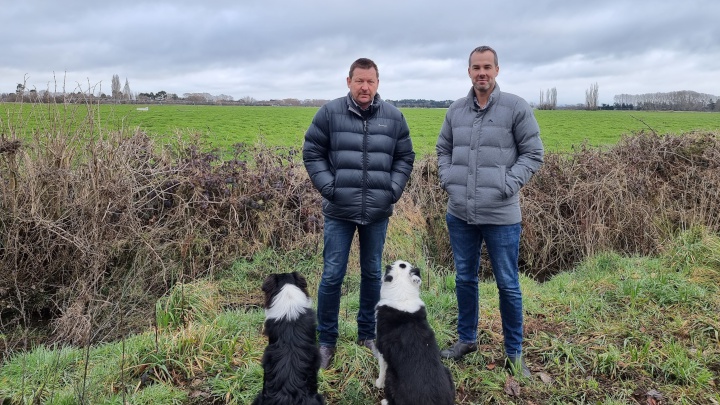Collaboration Key For Environmental Change
Reflecting on over decade of joint service to the Waimakariri Water Zone Committee, former chair Dave Ashby and deputy chair Cam Henderson view the collaborative approach adopted during the process that led to the Waimakariri part of proposed Plan Change 7 of the Land & Water Regional Plan (PC7) as the highlight of their time on the committee.
Caption: Former Waimakariri Water Zone Committee chair Dave Ashby and former deputy chair Cam Henderson consider teamwork and community participation as vital for improving local waterways.
Flaxton dairy farmer and farm consultant Dave Ashby, who served on the committee for eight years, chaired the committee during the consultation process and says it was a real period of growth and development for him in terms of working with a wide range of different people and dealing with swathes of scientific and technical data.
“I remember getting a huge binder of documents to read up on over the summer break as my introduction to the zone committee. Once I started reading through it, I got really interested in it and saw it as an opportunity to make a positive difference.
“The idea of local solutions to environmental issues formulated by the community was what really appealed to me. Working with people who hold a range of differing views and trying to come to a consensus on how we could make a positive difference to the environment was a learning curve, but through listening to each other we were able to achieve a lot in a short amount of time and come up with a plan that reflected what the community told us they wanted to see.”
Dave says the passion of the committee members and the community for leaving Waimakariri’s waterways in a better state than they found them was evident throughout his time on the committee. Getting farmers on board and having rūnanga representatives as committee members was also vital for developing a full understanding of the local environment.
“We learned the cultural values of water, and these were applied to everything that we did around the committee table and in the community. Getting the rural community engaged and involved in the process was really important too.”
Oxford farmer and DairyNZ associate director Cam Henderson, who joined the committee in 2017, part-way through the PC7 process, says the support the committee received from Environment Canterbury’s science team was invaluable.
“They explained the technical data to us in a way that both the committee and community could understand and this was a very important part of the consultation process.”
Cam says he also learned a lot by listening to and interacting with committee members and residents who held alternative views to his own.
“For me it was a real learning experience, and I even changed my original views on some points over time. That’s the benefit of the collaborative approach and having the time to question things and to get to the heart of issues.”
Being able to front up to public meetings and speak in front of hundreds of people was another new experience for Dave.
“We had to speak in front of our peers and emotions were running high, so you had to learn how to adapt and deal with difficult situations. Going out to the community and really listening and engaging with them takes time and I am really proud of what we were able to achieve as a committee.”
Both Dave and Cam hope that the thousands of hours collectively contributed to the Zone Implementation Programme and Addendum (ZIP and ZIPA) by the Waimakariri Water Zone Committee, Waimakariri District Council, Environment Canterbury, local iwi, and the wider community will be reflected in the PC7 document which is due to be considered by Environment Canterbury’s Council later this year.
“We mapped out a pathway to a better future for waterways throughout Waimakariri and retaining a local approach where our community takes action to tackle district-wide environmental issues is the key to improving our rivers and streams.”



 Gordon Campbell: On The New Pope, And The Israeli Attack On Peter Davis
Gordon Campbell: On The New Pope, And The Israeli Attack On Peter Davis New Zealand Labour Party: Labour Asks Why Govt Is Silent On Gaza
New Zealand Labour Party: Labour Asks Why Govt Is Silent On Gaza Transport Accident Investigation Commission: Near-Collision Highlights Safety Lessons For All Busy, Unattended Aerodromes
Transport Accident Investigation Commission: Near-Collision Highlights Safety Lessons For All Busy, Unattended Aerodromes Green Party: Wildlife Law Change A Deep Betrayal Of Public Trust
Green Party: Wildlife Law Change A Deep Betrayal Of Public Trust NZCTU: Unions Launch Petition To Protect Pay Equity
NZCTU: Unions Launch Petition To Protect Pay Equity Greenpeace: Greenpeace Slams PM’s Science Pick - 'Polluters Are Running The Show'
Greenpeace: Greenpeace Slams PM’s Science Pick - 'Polluters Are Running The Show' NZ Government: PM’s Science Prizes Celebrate Excellence
NZ Government: PM’s Science Prizes Celebrate Excellence


